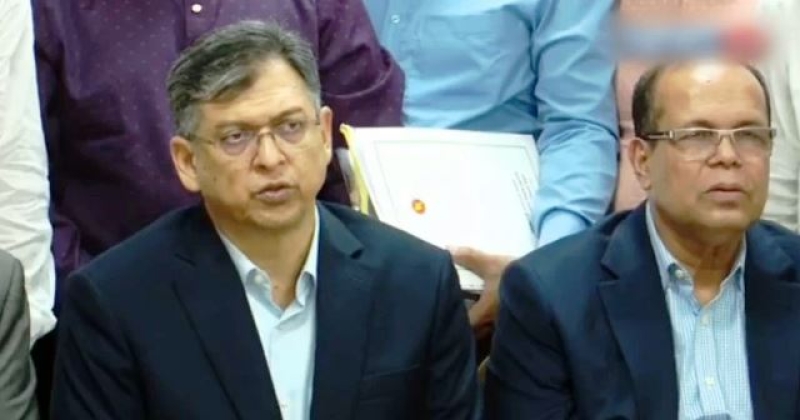- Man held for tying, beating up youth on theft suspicion in Gazipur |
- Sajid (2) lifted after 32 hrs from deep Rajshahi well, not alive |
- Spinning sector seeks urgent govt step to prevent collapse |
- Dilapidated bridge forces Lalmonirhat residents to risk life daily |
- High-level consultation to shape BD climate finance strategy |
Banning parties through executive order dangerous: Salahuddin

Salahuddin Ahmed, BNP Standing Committee member speaking at the National Consensus Building Commission meeting at the Foreign Service Academy on Sunday
Dhaka, Sept 16 - BNP senior leader Salahuddin Ahmed on Tuesday said banning any political party through an executive order would be a ‘dangerous practice’ and stressed that such matters must only be decided by courts.
“We do not support banning any party or its activities by executive order. If there are allegations against any political organisation—such as genocide, crimes against humanity or war crimes—these must be brought to court,” he said while talking to reporters at his Gulshan residence.
Salahuddin, a BNP standing committee member, said only through a judicial process can the fate of a party be determined, and the Election Commission would then be obliged to accept the court verdict.
He said the law has been amended to allow charges to be brought against a political party as an organisation, in line with constitutional provisions. “Earlier the law did not exist; now it has been amended. So, if anyone wants to bring charges against a party, they can place it before the court.”
Referring to demands by Jamaat-e-Islami and some other Islamist parties to ban the Jatiya Party and the 14-party alliance, Salahuddin said such calls should also be addressed through a legal process.
“If their allegations are genuine, let them raise them in court. Seeking to ban political parties through any other process, by executive order, would be a dangerous practice,” he warned.
The BNP leader also reminded that in the January 7, 2024 election, around 28 registered parties, including many smaller ones, participated. “If bans are sought in the name of fascism or dictatorship, then all 28 parties would need to be banned. Then with whom will the election be held?”
“In this country, those who are now demanding a ban on political parties—if they later say that they too will not take part in the election, then will there be any election at all? Their purpose behind such demands may be different. Perhaps they want to gain extra advantage by calling for more parties to be banned,” he said.
Salahuddin said the case of the Awami League was completely different, as the party was responsible for genocide, crimes against humanity and destroying the country’s democratic system.
He alleged that charges had already been brought in court against the fascist government, including the then prime minister, ministers, MPs and their associates, for genocide, crimes against humanity and destroying democracy.
“We demanded first that the Awami League, as a political party, should be brought to trial. The court will decide whether they can continue in politics or not,” Salahuddin said.
On the issue of constitutional reform, he said BNP will not support any “special constitutional order” or “extra-constitutional order” that bypasses Parliament. “That would create a bad example for the future. Only the Jatiya Sangsad is the proper forum to bring in necessary constitutional amendments.”
Salahuddin, however, said their party is open to any lawful and constitutional process agreed through discussions.
The BNP leader also warned of a constitutional vacuum if political stability and an elected government are not ensured within the set timeframe. “That vacuum could destroy national unity, open the door to fascism, and even draw in regional or global powers. We cannot take the country in that direction.”
Replaying to a question on the joint movement by Jamaat-e-Islami and some other Islamic parties demanding proportional representation and other reforms, Salahuddin made it clear that their party is deadly against PR system.
“We are against PR everywhere (both the lower and upper house). If any party wants it, they should put it in their manifesto and seek a mandate from the people. If the people support it, only then can they legislate,” he said.
The BNP leader also described the three-day protest programmes announced by Islamist parties as a possible attempt to derail the polls. “People have sacrificed too much for the right to vote and for democracy…. Any attempt to delay or obstruct the election for narrow political gain will be rejected by the people.” - UNB

